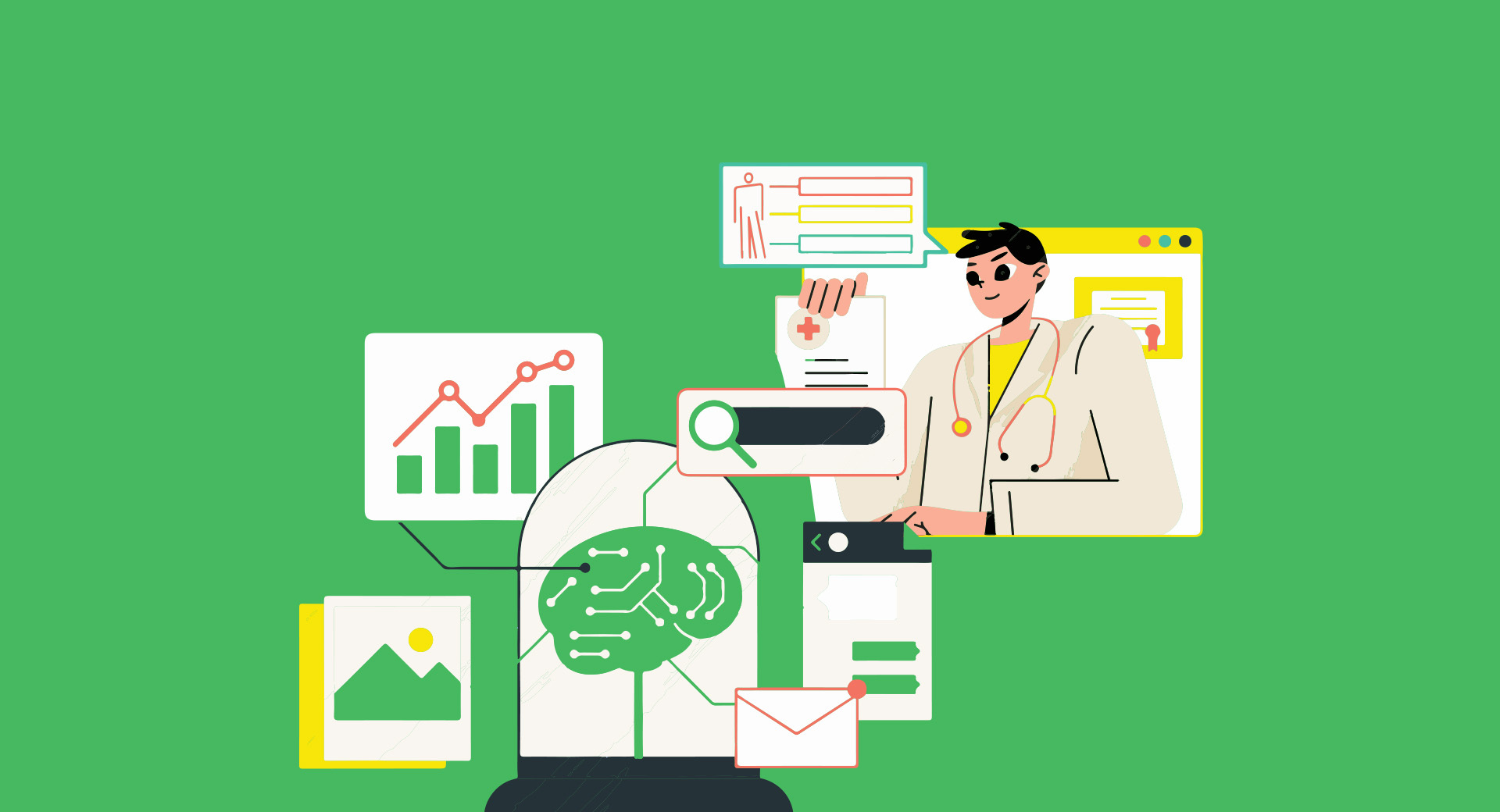The world of healthcare is constantly evolving, with new technologies and techniques being developed every day. One such technology that has made significant strides in the medical world is Artificial Intelligence (AI). AI has revolutionized medical imaging and diagnostics, making it easier for doctors to diagnose and treat patients more accurately. In this blog, we will take a detailed look at the role of AI in medical imaging, its impact on radiography and MRI, as well as advancements in CT scans, ultrasound technology, PET, and SPECT. We’ll also explore how AI is enhancing patient experience by personalizing treatment plans while addressing privacy and data security concerns. We’ll also provide an industry perspective on current market scenarios and future trends. Join us as we dive deeper into the world of AI-driven healthcare!
The Role of AI in Medical Imaging
Advancing the field of medical imaging, AI plays a crucial role in disease diagnosis and treatment. Analyzing medical images, significantly enhances the accuracy of diagnostic processes, aiding medical specialists in interpreting results with precision. AI technology not only contributes to the detection and treatment of diseases but also enriches patient care and treatment purposes. Medical imaging is important for cancer diagnosis and AI can help. AI makes the diagnosis process easier and more accurate, especially with mammography and nuclear medicine scanners. Medical doctors and technologists find AI useful in MRI scanners, CT scanners, and radiology.
Understanding AI and Its Applications
AI technology in medical imaging leverages machine learning algorithms for comprehensive image analysis, facilitating the interpretation of various types of medical imaging. The utilization of AI enhances the extraction of diagnostic insights from medical images, contributing to improved patient care. Continual advancements in AI in medical imaging lead to enhancements in technology, thus playing a pivotal role in addressing medical issues and fostering healthcare progress. The application of artificial intelligence in medical imaging continues to evolve, aligning with technological advances and progressively benefiting patient care.
AI’s Impact on Radiography and MRI
AI’s impact on radiography and MRI significantly enhances the accuracy of medical diagnostics. By utilizing deep learning algorithms, AI optimizes the analysis of radiographic and MRI images, leading to early detection of medical conditions. Additionally, it facilitates the precise identification of different tissues in radiography and MRI, ultimately improving patient care and treatment outcomes. The application of AI technology in radiography and MRI not only advances diagnostic accuracy but also contributes to the continual evolution of medical imaging techniques.
Here’s an article on Streamlining Diagnosis and Care: Healthcare Software, check it out!
Detailed Look at Medical Imaging Techniques
Medical imaging techniques such as positron emission tomography use AI technology to understand blood flow in the body. AI improves high-resolution imaging of different body parts, diagnoses heart disease, and enhances the visualization of blood vessels. It also increases the accuracy and precision of medical diagnostics, elevating patient care quality. With advanced computer vision and deep learning algorithms, AI optimizes the interpretation of medical images. This leads to early detection and precise identification of various medical conditions. AI’s role in medical imaging techniques, including electroencephalography (EEG), revolutionizes healthcare. It offers significant advancements in cancer diagnosis and treatment of other complex medical issues.
Advancements in CT Scans
Advancements in CT Scans in the medical field have transformed the precise diagnosis of cancer and inflammation through AI technology. This innovation enhances the interpretation of high-resolution medical images, optimizing the identification of hard tissues in the body. AI technology helps doctors see blood vessels better on CT scans. This can help doctors find medical problems earlier. AI improves imaging methods, so medical professionals can diagnose patients more accurately and quickly.
The Evolution of Ultrasound Technology
The integration of AI technology has significantly enhanced the diagnostic capabilities of ultrasound imaging, optimizing the analysis of sound waves and improving diagnostic accuracy. This advancement has revolutionized patient care by advancing the visualization of vital parts of the human body and enabling precise imaging of different tissues. Additionally, AI in ultrasound technology aids in the interpretation of medical images, contributing to more accurate diagnoses and treatment plans. The evolution of ultrasound technology with AI integration has had a profound impact on medical imaging, ultimately leading to improved patient outcomes and healthcare delivery.
The Future of PET and SPECT
Advancements in nuclear medicine and AI technology are revolutionizing the diagnosis of medical conditions through high-resolution PET and SPECT imaging. The utilization of AI optimizes the interpretation of medical images produced in these scans, contributing to the visualization of radioactive materials in the body. Furthermore, AI enhances the analysis of blood flow, leading to improved accuracy and elevating patient care. With the integration of AI in high-resolution PET and SPECT imaging, medical diagnostics are undergoing a significant transformation, promising increased precision and effectiveness in healthcare.
Check out an article about AI in Healthcare: Revolutionizing Healthcare Through AI Technology.
AI’s Influence on Medical Diagnostics
AI technology revolutionizes the diagnostic process, significantly improving precision in medical imaging. Medical imaging is made more accurate with AI, improving patient care by detecting medical issues early and enabling better treatment. Clinicians benefit from precise disease diagnosis, thanks to AI interpreting medical images. AI is changing the game in medical diagnostics, making diagnostic processes more efficient and enabling advanced treatment planning for better patient care.
Revolutionizing the Diagnostic Process
Medical image interpretation is improved by AI technology, making diagnoses more accurate and efficient. Early detection of medical conditions is possible through AI, which enhances patient care. Medical issues are diagnosed more precisely with AI’s assistance in visualizing medical conditions. AI has revolutionized the diagnostic process, contributing towards better healthcare standards. The implementation of AI in medical diagnostics plays a crucial role in advancing healthcare standards, ensuring a more accurate and efficient diagnostic process.
Increasing Accuracy and Precision
Revolutionizing diagnostic processes, AI technology enhances the interpretation of medical images, contributing to improved diagnostic accuracy. Medical imaging technology has been improved drastically with AI. It helps doctors diagnose diseases better, which means patients receive better care. The technology uses computer vision and NLP to detect medical conditions more accurately than ever before. This means that doctors can detect and treat illnesses earlier, which is critical for patient health. Additionally, AI in medical imaging benefits not only patients but also medical professionals who have access to advanced diagnostic tools, leading to better healthcare standards.
An article about Enhancing Patient Care: The Latest in Healthcare Technology might be of interest to you.
Patient Care and AI
AI in healthcare has significantly revolutionized medical diagnostics, particularly in the realm of medical imaging. With the aid of AI algorithms, medical imaging technology plays a crucial role in diagnosing various medical conditions and enabling early detection of diseases, such as heart disease. Techniques like MRI and CT scans, as well as angiography, have proven to be instrumental in diagnosing different tissues, further enhancing the accuracy and precision of medical diagnoses. AI-driven medical imaging technology has truly transformed patient care by improving diagnostic capabilities and ultimately enhancing the overall patient experience.
Enhancing Patient Experience with AI
By harnessing AI technology in medical imaging, healthcare providers can ensure high-resolution diagnostic imaging, contributing to personalized treatment plans. Advanced AI algorithms enable precise analysis of blood vessels, aiding in the development of accurate and personalized treatment strategies. Additionally, machine learning in medical imaging minimizes radiation exposure, prioritizing patient safety. Through deep learning, AI in medical imaging continuously improves diagnostic capabilities, enhancing the overall patient experience and revolutionizing healthcare diagnostics. This amalgamation of AI and medical imaging leads to significant advancements in patient care, ensuring precise diagnoses and tailored treatment plans.
AI’s Role in Personalized Treatment Plans
AI in healthcare employs computer vision for medical image analysis of hard tissues within the body, enabling early detection of cancer and inflammation. The technology’s AI algorithms significantly contribute to advancing treatment purposes and ensuring diagnostic accuracy for medical specialists. By utilizing MRI scanners and CT scanners, AI-driven medical imaging technology plays a crucial role in developing personalized treatment plans. This cutting-edge approach enhances the precision of medical diagnosis and treatment for improved patient care. The implementation of AI in medical imaging has proven instrumental in revolutionizing the healthcare industry by providing deeper insights into nuclear medicine, the human eye, and cancer diagnosis, thereby ensuring more effective and tailored treatment strategies.
Here’s an article on Enhancing Healthcare with Custom Software Solutions.
Risk and Safety Concerns in AI-Driven Healthcare
In healthcare, AI reduces radiation exposure by adhering to safety standards. Medical imaging with AI has significantly minimized radiation exposure, especially for vulnerable demographics like pregnant women. World Health Organization guidelines ensure patient safety in medical imaging. AI technology in medical diagnosis reduces radiation exposure, prioritizing patient safety. Integrating AI in medical imaging is essential for ensuring the well-being of individuals during diagnoses.
Addressing Privacy and Data Security
Ensuring the safety and privacy of medical imaging data is a paramount concern in healthcare AI. The advanced AI algorithms and technology in medical imaging comply with stringent FDA standards for data security, safeguarding patient privacy. With a focus on data encryption and access control, AI in medical imaging technology offers a robust shield against unauthorized breaches. Moreover, AI advancements in medical imaging technology guarantee the secure handling of sensitive medical imaging data, providing peace of mind to both patients and healthcare providers. This proactive approach to privacy and data security underscores the transformative impact of AI in ensuring the confidentiality and integrity of medical imaging information.
Radiation Exposure and Risk Management
Minimizing the risk of radiation exposure in medical imaging technology, including nuclear magnetic resonance (NMR), is a key focus of AI in healthcare. AI algorithms play a crucial role in addressing and managing the potential dangers associated with radiation exposure in medical diagnosis. With advancements in AI technology, the safety and welfare of patients regarding radiation exposure are significantly enhanced. The integration of AI in medical imaging technology ensures that radiation exposure during medical diagnosis is minimized, creating a safer environment for patients and medical professionals alike.
Check out an article about AI and Custom Software: The Future of Digital Solutions.
AI in Healthcare: An Industry Perspective
Transforming the healthcare industry, AI in medical imaging technology is paving the way for enhanced diagnostic capabilities and treatment innovations. By harnessing AI algorithms, medical imaging has evolved to offer unprecedented advancements, driving innovation and revolutionizing the landscape of medical diagnostics. This progressive technology not only presents new opportunities but also ensures greater precision in medical diagnosis and treatment. As we move forward, the integration of AI in healthcare is set to further reshape the industry, promising remarkable developments in nuclear medicine, cancer diagnosis, and radiology, and enhancing the overall quality of patient care.
Current Market Scenario
The current market scenario of medical imaging technology is heavily dominated by AI in healthcare. AI technology holds a prominent position in driving advancements in diagnostic imaging and shaping the landscape of medical diagnosis. The AI algorithms in medical imaging have revolutionized the market of medical diagnostics, offering a new level of precision and accuracy. This technology ensures the safety of patients by minimizing radiation exposure and addressing risks associated with medical diagnosis. With AI at the forefront, medical imaging technology is continuously evolving and transforming the healthcare industry, presenting new opportunities for innovation and improved patient care, including earning a certificate in a six-month program.
Future Trends and Predictions
The future of medical imaging technology is being shaped by AI in healthcare, driving advancements in diagnostic imaging as technology advances. AI algorithms are paving the way for future trends in medical diagnosis and predicting the trajectory of medical diagnostic imaging. As AI continues to evolve, it sets the stage for healthcare diagnosis, offering unprecedented opportunities for more accurate and precise cancer diagnoses, such as breast cancer detection. With the integration of AI, medical doctors and radiologists can expect enhanced capabilities in nuclear medicine, MRI scanners, CT scanners, and other imaging techniques, ultimately transforming the landscape of medical diagnostics.
Essential Considerations for AI Implementation in Healthcare
Strategic planning is essential for the successful implementation of AI in healthcare, particularly in medical imaging technology. Careful consideration of data security and patient privacy is imperative when integrating AI technology into medical imaging processes. Moreover, the vital role of medical imaging and its processing in medicine in the United States, where about 600 million imaging procedures are performed annually, must be meticulously evaluated when deploying AI algorithms in medical imaging. The advancements in AI technology call for a comprehensive approach to ensure successful implementation in the healthcare sector. Addressing these essential considerations will pave the way for the effective integration of AI in medical imaging technology, ultimately enhancing patient care and diagnostic processes.
What Does the Future Hold for AI in Medical Imaging and Patient Care?
The future of AI in medical imaging and patient care is promising. With the integration of AI, diagnostic processes are being revolutionized, leading to more accurate medical diagnostics. Additionally, AI technology is reshaping medical imaging techniques, enhancing analysis and diagnosis for early detection and treatment purposes. Future advancements in AI-driven medical imaging will greatly benefit patient care.
Conclusion
In conclusion, AI has revolutionized the field of medical imaging and patient care. It has improved the accuracy and precision of diagnostic processes, leading to better treatment outcomes. AI-powered technologies like CT scans, ultrasound, PET, and SPECT have advanced significantly, making medical imaging more efficient and effective. Additionally, AI has enhanced the patient experience by personalizing treatment plans and improving overall care. However, it is important to address the risks and safety concerns associated with AI-driven healthcare, such as privacy and data security, as well as radiation exposure. As the industry continues to evolve, it is crucial for healthcare organizations to carefully consider the implementation of AI and stay updated with the latest advancements. If you’re interested in exploring the possibilities of AI in medical imaging and patient care, get in touch with us for more information and assistance.




[…] You might want to check 11 SaaS Success Stories Worldwide with Real-World Examples. […]
[…] Additionally, check out an article on 11 SaaS Success Stories Worldwide with Real-World Examples. […]
[…] are some of the SaaS success stories that highlight the tangible benefits that come from careful planning, selecting the right SaaS […]
[…] options, and personal touches—these are the secret sauce to truthfully happy and loyal customers (Asterdio). Here’s the […]